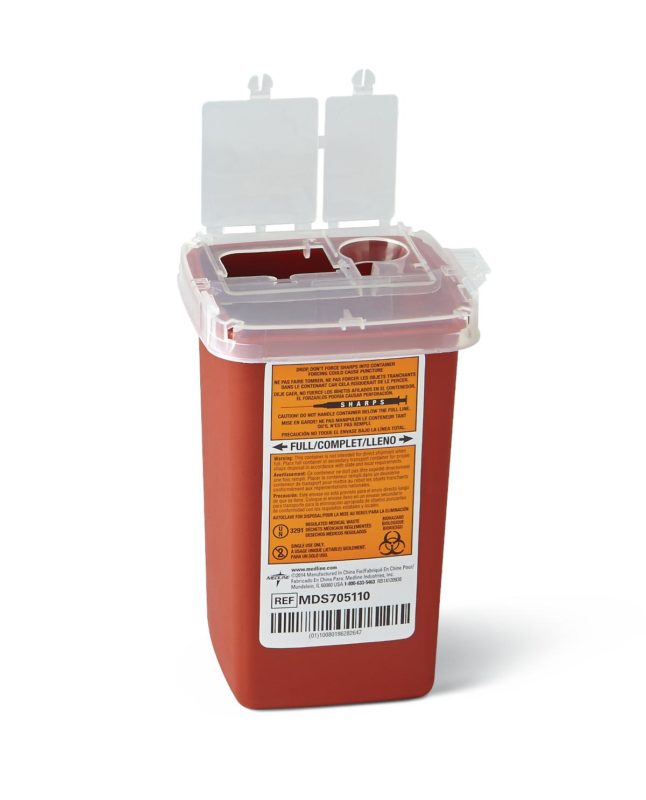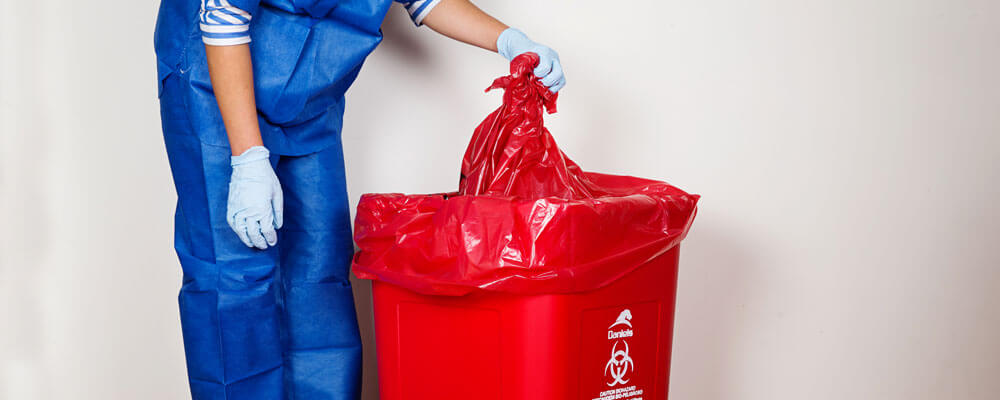Shielding Health: Professional Medical Waste Removal Services for a Tidy Environment
Shielding Health: Professional Medical Waste Removal Services for a Tidy Environment
Blog Article
The Value of Proper Clinical Garbage Disposal: An Overview for Health Care Facilities
Appropriate medical garbage disposal is a critical aspect of health care center administration, making sure the safety and wellness of individuals, team, and the atmosphere. From comprehending the various classifications of clinical waste to abiding by governing needs, health care centers need to adopt effective waste partition practices and select ideal disposal techniques. The importance of correct medical waste disposal goes beyond simple compliance; it is a duty that calls for recurring training and education for staff. In this overview, we will certainly discover the different aspects of medical garbage disposal and highlight the crucial steps that healthcare facilities ought to take. By executing these methods, medical care facilities can reduce threats, protect public health and wellness, and add to a cleaner, more secure environment.
Comprehending Medical Waste Categories
Comprehending medical waste categories is important for appropriate disposal in medical care facilities. Medical waste is a broad term that encompasses different sorts of waste created in medical care setups, such as facilities, labs, and hospitals. Classifying medical waste aids make certain that it is managed, stored, and disposed of securely and according to appropriate regulations.
There are numerous categories of clinical waste that healthcare facilities need to be mindful of. These classifications consist of contagious waste, sharps waste, pharmaceutical waste, chemical waste, and contaminated waste (medical waste disposal services with WasteX). Each group has particular attributes and requires different disposal techniques to decrease the threat of harm to health care employees, patients, and the environment
Contagious waste, for example, refers to lose contaminated with possibly transmittable products, such as blood, body fluids, and tissues. Drug waste is composed of run out or extra medicines, while chemical waste consists of dangerous chemicals used in medical treatments.
Compliance With Regulatory Demands
Health care centers should make certain conformity with regulative demands for proper medical waste disposal. Governing bodies, such as the Epa (EPA) and the Occupational Security and Health Management (OSHA), have actually established guidelines and guidelines to secure public health and the environment. These guidelines describe the correct handling, storage, transportation, and disposal of clinical waste.
Compliance with regulative requirements is essential for health care facilities to prevent legal fines, reputational damage, and potential injury to human health and wellness and the environment. Failure to adhere to these regulations can lead to penalties, legal actions, and even the suspension or retraction of running licenses.
To ensure compliance, medical care centers ought to develop detailed waste management programs that consist of staff training, appropriate waste partition, and the use of proper containers and labels. Normal audits and evaluations need to likewise be conducted to recognize any non-compliance concerns and resolve them immediately.
It is essential for health care facilities to keep up to day with changes in policies and update their waste monitoring practices appropriately. This can be attained by proactively keeping track of updates from regulative bodies and taking part in training programs and workshops.
Applying Reliable Waste Partition Practices
To guarantee correct medical waste disposal, medical care facilities should carry out efficient waste segregation methods. Waste segregation is a critical action in the general waste administration process, as it assists reduce the risk of infection, prevents cross-contamination, and guarantees the safe disposal of various kinds of waste. Effective waste partition methods involve dividing medical waste right into different groups based on its attributes and potential risks.
One typical practice is the segregation of sharps waste, such as scalpels and needles, from other kinds of clinical waste. Sharps waste need to be positioned in puncture-resistant containers to protect against injuries and possible infections. Furthermore, contaminated materials, such as chemicals and drugs, should be separated from general clinical waste to stop environmental contamination.
Correct labeling and color-coding of waste containers are important for effective waste segregation. Visible and clear tags need to be put on each container to show the kind of waste it has and any special delivery demands - medical waste disposal services with WasteX. Additionally, color-coding can be utilized to distinguish in between different waste classifications, making it much easier for healthcare personnel to identify and dispose of waste properly
Routine training and education and learning for medical care personnel is critical for the successful application of waste partition techniques. Personnel members need to be educated on the different waste groups, appropriate segregation methods, and the relevance of adhering to waste administration procedures. This will certainly assist guarantee compliance and consistency in waste segregation methods throughout the center.
Finding Appropriate Disposal Approaches
Proper choice of proper disposal techniques is crucial in guaranteeing the risk-free and ecologically accountable monitoring of medical waste in healthcare facilities. Health care centers create a variety of medical waste, consisting of sharps, contagious waste, pharmaceutical waste, and chemical waste - medical waste removal near me. Each kind of waste requires details disposal approaches to lessen the threat of contamination, injury, and ecological damage
One common disposal approach for clinical waste is incineration. Incineration includes the controlled burning of waste at heats. This technique works in destroying virus and decreasing the volume of waste. Nevertheless, it can launch dangerous toxins into the air if not properly controlled.

Chemical disinfection is one more technique made use of for specific kinds of medical waste, such as pharmaceutical waste. This technique makes use of chemicals to neutralize or destroy impurities. However, it is essential to choose chemicals that are ecologically friendly and safe.
In some visit the site situations, landfill disposal may be appropriate for non-hazardous clinical waste (medical waste disposal services with WasteX). Correct partition and product packaging are important to prevent leakage or contamination.
Ultimately, healthcare facilities have to thoroughly examine the qualities of their medical waste and pick suitable disposal methods that focus on security, environmental protection, and governing conformity. Regular training and surveillance are vital to make certain that health care staff complies with appropriate disposal protocols.

Training and Educating Team on Proper Disposal Treatments
Staff education and learning and training play a vital role in making certain the appropriate disposal of clinical waste in healthcare facilities. It is vital that all team member, including medical professionals, nurses, professionals, and support team, receive comprehensive training on appropriate disposal treatments. This training ought to cover the various sorts of clinical waste, their potential threats, and the suitable approaches for dealing with, setting apart, and dealing with them.
One of the main objectives of staff education and training is to ensure that all health care professionals recognize the value of proper disposal treatments and the prospective repercussions of inappropriate waste management. They require to be knowledgeable about the threats related to clinical waste, such as the transmission of infections and the contamination of the atmosphere. medical waste removal near me. By comprehending these dangers, team member will be extra determined to comply with appropriate disposal methods and take the essential safety measures to shield themselves, their associates, and the area
Training ought to also cover making use of individual safety equipment (PPE) and the proper strategies for dealing with clinical waste. Team member ought to be enlightened on just how to identify and segregate different types of waste, such as sharps, infectious waste, and hazardous chemicals. They ought to likewise be trained on the proper use of waste containers, such as sharps containers and biohazard bags, as well as the value of labeling and securing these containers properly.
Additionally, personnel education and training ought to consist of routine updates and refresher course training courses to ensure that medical care professionals remain educated regarding the most up to date policies and ideal techniques in clinical garbage disposal. This continuous education is essential to preserve a high degree of recognition and conformity among team member.
Final Thought
To conclude, proper medical garbage disposal is of utmost value for healthcare facilities. Understanding the different classifications of medical waste and following governing demands blog here guarantees the safety and security and well-being of both health care workers and the basic public. Executing effective waste partition techniques and selecting proper disposal techniques are essential in preventing the spread of contagious diseases and safeguarding the atmosphere. Last but not least, training and educating staff on appropriate disposal treatments is important for preserving a safe and clean healthcare center.
From understanding the various categories of clinical waste to complying with regulatory demands, medical care facilities must take on efficient waste segregation techniques and choose proper disposal methods. These categories consist of contagious waste, sharps waste, pharmaceutical waste, chemical waste, and contaminated waste.To guarantee appropriate clinical waste disposal, medical care facilities have to execute reliable waste partition methods. Waste partition is a vital action in the total waste administration procedure, as it aids minimize the risk of infection, avoids cross-contamination, and ensures the risk-free disposal of different kinds of waste. Health care centers generate a range of clinical waste, including sharps, infectious waste, pharmaceutical waste, and chemical waste.
Report this page